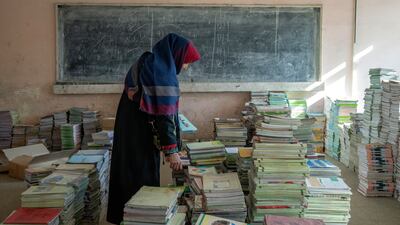For countless women in Afghanistan and those fighting for basic women's rights in the country – to be educated and to hold a job, among others – the past week has all but flattened any hope of change or progress.
Since the Taliban took power last August, several human rights considered normal or regular in most countries have been pushed out of reach for Afghan women.
The yet incalculable loss is bound to be colossal. But university education for women is only the latest right to be taken away from Afghan students. Earlier in the year, in March, secondary education was denied similarly and arbitrarily to half the population. More than 11 million Afghans, almost one third of the entire population, are women and girls said to be under the age of 25.
For protesting this latest diktat, women in Afghanistan have been arrested, a further chapter "enabling gender apartheid", as Lana Nusseibeh, the UAE's ambassador to the UN, told the UN Security Council in October. Videos on social media on Thursday showed about two dozen hijab-wearing Afghan women on the streets of Kabul, on a protest march, lifting banners and making clear in their slogans their anger, reminiscent of the unprecedented women's protests in Iran.
If there was any doubt over the negotiability or severity of the latest education ban, it was quickly made clear. Outside several universities in Kabul and other big cities this past week, armed vehicles were parked to impose the ban, as reported in The National. In Afghan provinces, officials sent reportedly sent women back in tears. Some Afghan male students walked out of class in solidarity with their female classmates.
The Taliban rulers followed the university ban with further damage to women, in their subsequent ban on Afghan women working for NGOs. US Secretary of State Antony Blinken said women were "central to humanitarian operations around the world" and that the ban would be "devastating" to Afghans. The EU, a major funder of aid organisations that work in Afghanistan, also condemned the new ban.
Given the cumulative demolition of Afghan hope in the past few days – to women in Afghanistan, most directly, but also to Afghans at large, men included, and to disheartened Afghans outside the country, any flickering optimism about a hopeful direction that the Afghan regime could yet take, has been shelved. As Obaidullah Baheer wrote in these pages this week, "there is little reason to take the Taliban at their word on the temporary nature of the bans".
The international community has rightly made its disapproval quite clear. The UAE Ministry of Foreign Affairs and International Co-operation said: “The UAE reaffirms that this decision, as well as the earlier bans on girls from accessing secondary education, violate fundamental human rights, contravene the teachings of Islam, and must be swiftly reversed.”
Several others in the international community, including Saudi Arabia, expressed their disagreement with the Taliban. As seen in Muslim-majority countries, and clearly in Gulf countries, where women hold prominent leadership roles in every sector, nowhere in Islam is a woman's right to be educated in question.
British Prime Minister Rishi Sunak said, as a father to daughters, he couldn't imagine a world in which they're denied an education.
To not let the plight of women slide back to the ruinous condition that the Taliban can take credit for in their previous tenure in power in the 1990s will require enormous effort and the determination by several international stakeholders to hold talks with the Taliban. It will be a collective task to pressure the group to walk a different path, towards creating emancipation or equality that so many Afghan women have dared wish for and clearly are entitled to in Islam.
For that to happen, Taliban leaders need to recognise that the damage that their debilitating bans inflict is not just on women. Entire countries suffer when their chances of progress are cut down in half. The optimistic view perhaps is that it is not too late to reverse the damage. Afghan women deserve better, as does their entire country.


